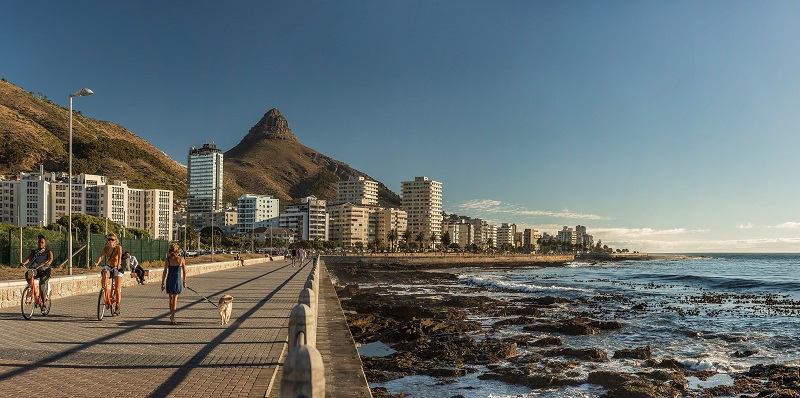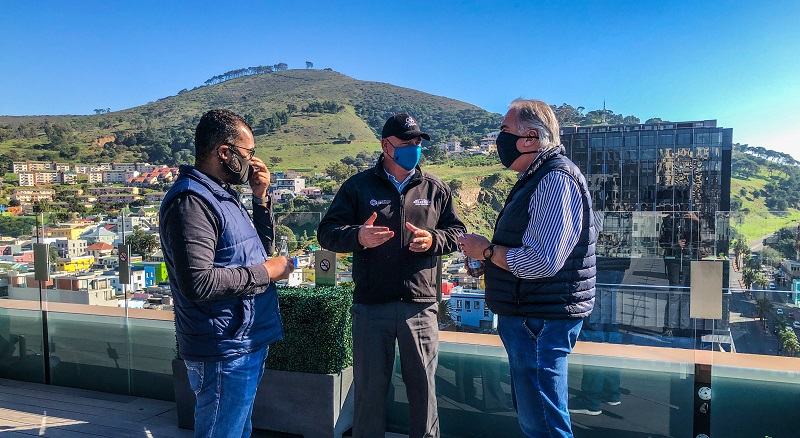How Cape Town Is Rebuilding a Resilient Visitor Economy
28 May 2021
Since the City of Cape Town started formally monitoring and measuring the economic value of tourism (EVT) in 2008, there has been evidence of a steady growth in the overall share of South Africa’s total foreign and domestic tourist numbers and expenditure accruing to Cape Town and the Western Cape.
According to EVT research and projections undertaken by I and M Futureneer Advisors, this ongoing improvement in tourism value gained significant momentum in 2019, with an estimated 1.7 million foreign tourists visiting Cape Town, staying a total of 18.6 million bed nights, and spending around ZAR17.5 billion rand (US$1.27bn*) in and around the city. And the figures for domestic tourism in 2019 were equally impressive, with an estimated 1.4 million South African’s visiting Cape Town, staying a total of 7.2 bed nights, and ploughing ZAR3.4 billion (US$246m*) of revenue into the local economy.
The high tourism cost of Covid-19
Martin Jansen van Vuuren, Managing Director of I and M Futureneer Advisors, says the arrival in South Africa of Covid-19, early in 2020, and the subsequent national lockdown response, effectively put paid to this healthy momentum for most of that year. “In addition to the devastating impact of the level 5 lockdown, and the concomitant border closures, which effectively shut down all tourism and hospitality activity for two months,” Jansen van Vuuren says, “the reintroduction of level 3 lockdown in December – traditionally Cape Town’s tourism high season – delivered another heavy blow to tourism stakeholders just as they were anticipating the start of a recovery
That December 2020 lockdown alone, is estimated by I and M Futureneer Advisors to have cost members of Cape Town Tourism, the city’s official regional tourism organisation, around ZAR2 billion, and resulted in more than 11 580 job losses.
Signs of gradual improvement in 2021
Fortunately, the far reaching measures and safety protocols introduced across South Africa in response to Covid-19 have paid dividends, and despite a second wave of the virus early in the year, the first half of 2021 has been characterised by a steady, albeit gradual, recovery in economic activity across the country.
In Cape Town, tourism is once again proving to be a key driver of this economic recovery and growth. This is evidenced both by increasing airport arrivals and improving traveller sentiment. Domestic arrivals at Cape Town International Airport have increased from just over 53 000 in August last year, to close to 218 500 in April 2021; representing a post-Covid-19 recovery of around 61%. And a dipstick survey into consumer sentiment in Cape Town ahead of Easter showed that 28% people surveyed intended travelling locally over that long weekend, and many more had longer-term getaway plans for later in 2021.
Prioritising visitor safety
According to Enver Duminy, Chief Executive Officer of Cape Town Tourism, the steady increase in tourism consumer confidence can be attributed to a number of factors, the most significant of which is the absolute commitment of all stakeholders in Cape Town’s visitor economy to adhering rigidly to health and safety regulations and protocols.
“The primary concern amongst all prospective visitors to Cape Town is safety,” Duminy emphasises, “and Cape Town’s tourism and hospitality industries recognise and embrace this imperative and are to be commended for their tireless commitment to making visitor health and safety their number one priority.”
Duminy is confident that tourism businesses of every shape and size share the same commitment to keeping their guests, their staff, and their communities safe, which means that no matter where a local or international visitor goes in Cape Town, they will find the same strict safety protocols in place. And he says that this visible safety commitment is one of the keys that is unlocking tourism’s sustainable recovery.
“We are confident that this safety commitment across our industry, combined with the increasing protection from infection that is being achieved as South Africa’s vaccination rollout gains momentum, will encourage people from around the world to once again come and experience the unparalleled beauty, hospitality and affordability that Cape Town has to offer,” Duminy explains.
Unlocking the power of strong tourism partnerships
Duminy’s confidence is shared by Jeremy Clayton, Chairman of the Western Cape chapter of the Federated Hospitality Association of Southern Africa (FEDHASA) and Director of The President Hotel in Cape Town. He points out that, in addition to the importance of a health and safety commitment, a key driver of the recovery of Cape Town’s visitor economy in the coming years will be the incredible commitment of all the industry’s participants to work together to drive that recovery.
“The stellar growth we saw in visitors and value leading up to Covid-19 was due, in no small part, to this collaborative spirit amongst Cape Town’s tourism stakeholders,” Clayton explains.
I have no doubt that the ability of our local and regional industry to fall back on this strong legacy of cooperation, teamwork and shared ideals during the pandemic and the height of lockdown restrictions, proved to be the saving grace for many tourism and hospitality businesses in 2020.
Clayton says that in both his roles as FEDHASA Western Cape Chair and Director of one of Cape Town’s most prestigious hotels, he has seen evidence that this same spirit of collaboration and care is not only driving the tourism recovery in Cape Town in 2021, but is helping to rebuild the visitor economy into an even more robust and resilient cornerstone of the city’s future economic growth. And he points out that planning for a comprehensive tourism joint initiative involving all Cape Town tourism participants is already well underway. While the details of the initiative are still under wraps, Clayton is confident that once implemented, it will serve to harness the full power of this collaborative Cape Town spirit and drive significant benefits for tourism businesses and investors, while further enhancing the visitor experience in the city.
A focus on innovation, collaboration and positive change
And there’s another aspect of Cape Town’s visitor economy on which Duminy, Clayton and Jansen van Vuuren all agree – which is that with the right combination of innovation, entrepreneurial support, and superior value creation, the city’s tourism sector has a unique opportunity to elevate its pre-Covid-19 growth trajectory and eventually surpass previous predictions of its economic contribution potential.
“Covid-19 has not only been an eye-opener for our industry, it has also been a powerful catalyst for positive change,” Duminy explains, “and while we have no intention of adjusting our established tourism vision and goals, the recovery of the industry is clearly happening on the back of a different approach – one characterised by a reassessment of how we work and the value we add to visitors, a repositioning of our offerings to differentiate them even further from those of the rest of the world, and a recommitment to industry collaboration over competition, in order to drive Cape Town’s tourism evolution and sustainable growth for the benefit of all.”
Added Alderman James Vos, the City’s Mayoral Committee Member for Economic Opportunities, which includes Tourism: “I am pleased to say that we are constantly implementing measures to drive the various stages of economic recovery and tourism readiness as outlined in our recently adopted ten-point tourism strategy. I trust that these initiatives will help tourism flourish in the challenging weeks and months ahead, within the framework of strict Covid-19 protocols.”
*Conversion rate of ZAR13.83 to the US$



